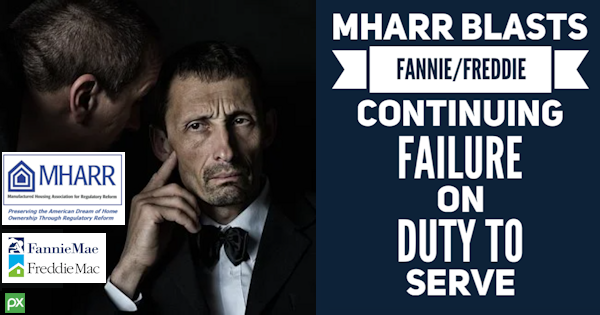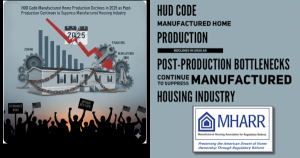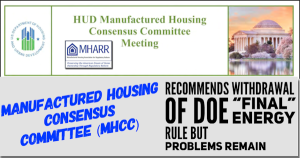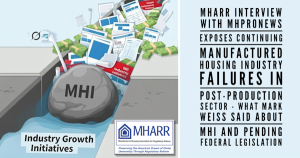Manufactured Housing Association for Regulatory Reform Blasts Fannie/Freddie Continuing Failure On Duty To Serve

Washington, D.C., July 15, 2021 – The Manufactured Housing Association for Regulatory Reform (MHARR) at a July 14, 2021 “listening session” conducted by the Federal Housing Finance Agency (FHFA) and in written comments filed with that agency see, Copy attached has blasted the deletion of any manufactured home personal property loan support mechanisms from the latest Duty to Serve Underserved Markets (DTS) “implementation” plans filed by Fannie Mae and Freddie Mac. Those proposed plans, which cover the period from 2022 to 2024 and must be approved by FHFA in its capacity as the Government Sponsored Enterprises’ (GSEs) federal regulator, exclude any type of secondary market or securitization support for the vast bulk of manufactured home purchase loans (76% of the total manufactured housing market as reported by the U.S. Census Bureau) that are secured by the home itself, without land.
For more than a decade since the enactment of the congressional DTS mandate – which expressly includes and authorizes support for – manufactured home personal property loans, Fannie Mae and Freddie Mac have touted their alleged intent to ultimately provide secondary market and securitization support for such personal property loans. Thus, previous DTS plans and modifications filed by the GSEs have provided for DTS personal property loan “pilot programs” in their later years. Such pilot programs were proposed, ostensibly, to allow the GSEs to develop loan performance data for chattel loans within the manufactured housing market and, thereby provide a basis for the GSEs to develop and price more extensive chattel support products in future plans.
At each subsequent step, though, Fannie Mae and Freddie Mac have consistently retreated from their earlier commitments to explore and analyze the chattel submarket, to the point that their 2022-2024 proposed plans contain no programs or products whatsoever to even begin serving that submarket. As a result, the 2022-2024 DTS proposed plans effectively ignore – and fail to serve, in any manner – nearly 80% of the total manufactured housing market, while existing DTS programs serve only 5-6% of the total market. Put simply, as MHARR has pointed out previously, such levels are not in compliance with any type of reasonable construction or understanding of DTS and, in fact, constitute a repudiation of both DTS and Congress’ mandate for the GSEs to finally begin serving the manufactured housing market and the lower and moderate-income American families who rely on affordable, mainstream manufactured housing, in a non-discriminatory, market-significant manner.
MHARR’s comments, moreover, citing data developed by the Consumer Financial Protection Bureau (CFPB) and published in a May 2021 report, stressed that the GSEs’ continuing failure and refusal to serve the manufactured home personal property market, disproportionately impacts – and harms – “Hispanic white, Black and African-American , and American Indian and Alaska Native borrowers [who] make up larger shares of chattel loan borrowers than among … site-built loan borrowers.” This directly conflicts with – and violates – the most fundamental policies of the Biden Administration, as set forth in Executive Order 13985 (January 20, 2021). That Order states, in part: “Affirmatively advancing equity, civil rights, racial justice and equal opportunity is the responsibility of the whole of government. Because advancing equity requires a systematic approach to embedding fairness in decision-making processes, executive departments and agencies mustrecognize and work to redress inequities in their policies and programs that serve as barriers to equal opportunity.” (Emphasis added). The very next paragraph makes it clear, moreover, that this includes “closing racial gaps in wages, housing credit [and] lending opportunities,” among other things. (Emphasis added).
In Washington, D.C., MHARR President and CEO, Mark Weiss, stated: “It is incumbent on the new leadership at FHFA – put in place by the Biden Administration – to finally begin complying with DTS as written and as designed by Congress, to remedy decades of discrimination by Fannie Mae and Freddie Mac against manufactured housing and lower and moderate-income manufactured housing consumers. As a result, Fannie Mae and Freddie Mac’s proposed 2022-2024 DTS plans, with respect to manufactured housing, should be rejected by FHFA, with a directive to both Enterprises to stop their decade-plus DTS ‘shell game’ and finally begin serving the mainstream, affordable manufactured housing market in a market-significant manner, as intended by DTS.”
The Manufactured Housing Association for Regulatory Reform is a Washington, D.C.-based national trade association representing the views and interests of independent producers of federally-regulated manufactured housing.
Attached copy


Washington, D.C., July 15, 2021 – The Manufactured Housing Association for Regulatory Reform (MHARR) at a July 14, 2021 “listening session” conducted by the Federal Housing Finance Agency (FHFA) and in written comments filed with that agency see, Copy attached has blasted the deletion of any manufactured home personal property loan support mechanisms from the latest Duty to Serve Underserved Markets (DTS) “implementation” plans filed by Fannie Mae and Freddie Mac. Those proposed plans, which cover the period from 2022 to 2024 and must be approved by FHFA in its capacity as the Government Sponsored Enterprises’ (GSEs) federal regulator, exclude any type of secondary market or securitization support for the vast bulk of manufactured home purchase loans (76% of the total manufactured housing market as reported by the U.S. Census Bureau) that are secured by the home itself, without land.
For more than a decade since the enactment of the congressional DTS mandate – which expressly includes and authorizes support for – manufactured home personal property loans, Fannie Mae and Freddie Mac have touted their alleged intent to ultimately provide secondary market and securitization support for such personal property loans. Thus, previous DTS plans and modifications filed by the GSEs have provided for DTS personal property loan “pilot programs” in their later years. Such pilot programs were proposed, ostensibly, to allow the GSEs to develop loan performance data for chattel loans within the manufactured housing market and, thereby provide a basis for the GSEs to develop and price more extensive chattel support products in future plans.
At each subsequent step, though, Fannie Mae and Freddie Mac have consistently retreated from their earlier commitments to explore and analyze the chattel submarket, to the point that their 2022-2024 proposed plans contain no programs or products whatsoever to even begin serving that submarket. As a result, the 2022-2024 DTS proposed plans effectively ignore – and fail to serve, in any manner – nearly 80% of the total manufactured housing market, while existing DTS programs serve only 5-6% of the total market. Put simply, as MHARR has pointed out previously, such levels are not in compliance with any type of reasonable construction or understanding of DTS and, in fact, constitute a repudiation of both DTS and Congress’ mandate for the GSEs to finally begin serving the manufactured housing market and the lower and moderate-income American families who rely on affordable, mainstream manufactured housing, in a non-discriminatory, market-significant manner.
MHARR’s comments, moreover, citing data developed by the Consumer Financial Protection Bureau (CFPB) and published in a May 2021 report, stressed that the GSEs’ continuing failure and refusal to serve the manufactured home personal property market, disproportionately impacts – and harms – “Hispanic white, Black and African-American , and American Indian and Alaska Native borrowers [who] make up larger shares of chattel loan borrowers than among … site-built loan borrowers.” This directly conflicts with – and violates – the most fundamental policies of the Biden Administration, as set forth in Executive Order 13985 (January 20, 2021). That Order states, in part: “Affirmatively advancing equity, civil rights, racial justice and equal opportunity is the responsibility of the whole of government. Because advancing equity requires a systematic approach to embedding fairness in decision-making processes, executive departments and agencies mustrecognize and work to redress inequities in their policies and programs that serve as barriers to equal opportunity.” (Emphasis added). The very next paragraph makes it clear, moreover, that this includes “closing racial gaps in wages, housing credit [and] lending opportunities,” among other things. (Emphasis added).
In Washington, D.C., MHARR President and CEO, Mark Weiss, stated: “It is incumbent on the new leadership at FHFA – put in place by the Biden Administration – to finally begin complying with DTS as written and as designed by Congress, to remedy decades of discrimination by Fannie Mae and Freddie Mac against manufactured housing and lower and moderate-income manufactured housing consumers. As a result, Fannie Mae and Freddie Mac’s proposed 2022-2024 DTS plans, with respect to manufactured housing, should be rejected by FHFA, with a directive to both Enterprises to stop their decade-plus DTS ‘shell game’ and finally begin serving the mainstream, affordable manufactured housing market in a market-significant manner, as intended by DTS.”
The Manufactured Housing Association for Regulatory Reform is a Washington, D.C.-based national trade association representing the views and interests of independent producers of federally-regulated manufactured housing.
Attached copy














